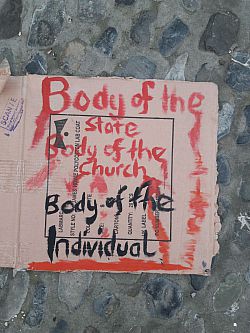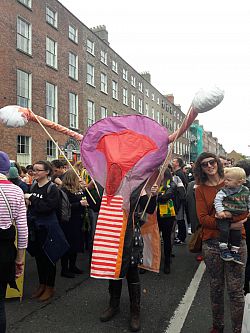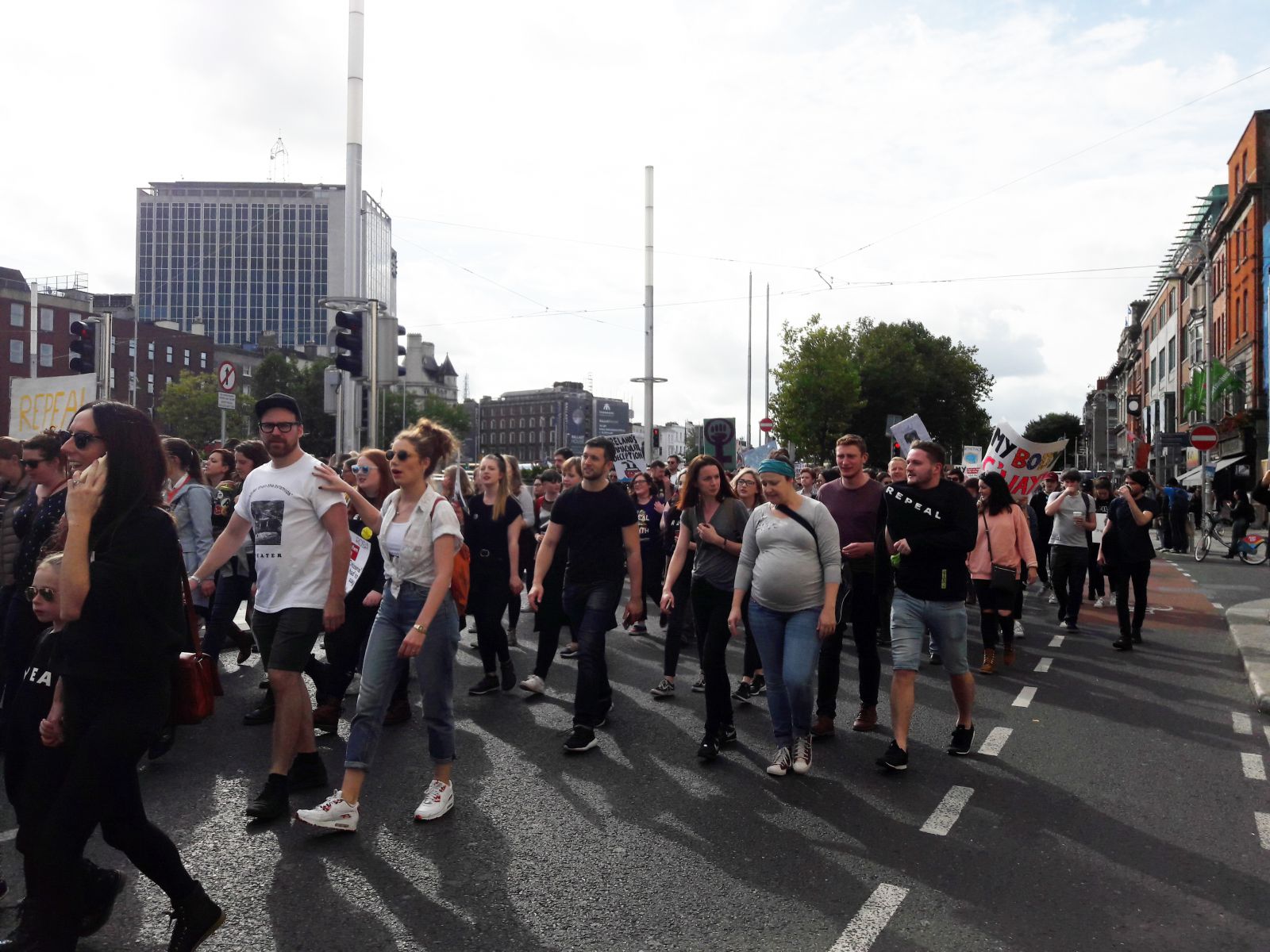CORTH Blog: 31 October 2017
 Dr Ben Kasstan
Dr Ben Kasstan
Research Fellow in Anthropology, University of Sussex
Email: b.kasstan@sussex.ac.uk
Twitter: @kasstanb
My role as an anthropologist involves researching and analysing the complex ways through which human health is socially, politically, and economically constituted and constrained. Reproduction and abortion are clear examples of the relationship between individual health and these broader structures: the autonomy and choices that women make depend on the choices that are made available and accessible — and this varies from country to country, and even region to region. I want to draw attention to restrictive access to abortion in Ireland, how it reflects the contemporary global politics of reproduction, and argue why we need to have difficult conversations in our lecture halls to engender change in our societies.
On 30 September 2017 I joined tens of thousands of demonstrators in Dublin as part of the 6th March for Choice to demand free, safe and legal access to abortion in Ireland. Abortion legislation in Ireland is the most restrictive in Europe, and has received sustained criticism from the UN Human Rights Committee in recent years for violating the human rights of women. Public and international condemnation is pinned on Article 40.3.3, inserted into the Irish Constitution by its Eighth Amendment, which upholds an equal right to life between a woman and the embryo or fetus she carries. This legislation is characteristic of the union between ‘church and state’ in Ireland.
Women can only access abortion services “legally” in Ireland if their life is considered to be in immediate danger. The reality of the situation is that clinicians are left to interpret the meaning of danger, which can have damaging effects on women and healthcare professionals (as well as the trust between them). Currently the only other “legal” measure at the disposal of women in Ireland is to access abortion services abroad, at their own expense and without the support of family and friends. Repealing or making any changes to the Eighth Amendment would require a referendum, which has been scheduled for 2018 though a specific voting date or question is yet to be made publically available.
 The majority of protestors at the 6th March for Choice were youths and students, who voiced their anger as well as their aspiration to have free, safe and legal access to abortion in Ireland. Their calls ranged from ‘vulva la resistance’ to ‘fuck the state, repeal the Eighth’ and ‘get your rosaries off our ovaries.’ The meanings behind all of these messages and placards are clear: the state of abortion politics (inspired by Catholicism) and consequent restrictions on women’s bodily autonomy would no longer be tolerated among the (mainly youth) protestors. This does not necessarily mean, however, that the majority of citizens in Ireland would be willing to vote in favour of changing abortion legislation in the 2018 Referendum, which will ultimately depend on the alternative arrangement presented for public vote.
The majority of protestors at the 6th March for Choice were youths and students, who voiced their anger as well as their aspiration to have free, safe and legal access to abortion in Ireland. Their calls ranged from ‘vulva la resistance’ to ‘fuck the state, repeal the Eighth’ and ‘get your rosaries off our ovaries.’ The meanings behind all of these messages and placards are clear: the state of abortion politics (inspired by Catholicism) and consequent restrictions on women’s bodily autonomy would no longer be tolerated among the (mainly youth) protestors. This does not necessarily mean, however, that the majority of citizens in Ireland would be willing to vote in favour of changing abortion legislation in the 2018 Referendum, which will ultimately depend on the alternative arrangement presented for public vote.
The struggle to ‘repeal the Eighth’ in Ireland is not occurring in isolation, and can be situated in a disturbing pattern of assaults against reproductive rights in global politics that are deeply embedded in patriarchy. The photograph of the US President (alongside his all-male advisors) instituting the Mexico City Policy or ‘global gag’ was a reminder of the reigning patriarchal order and its command over reproduction, women’s bodies and health. With the strike of a pen, funds that are essential for international NGOs in low and middle-income countries to counsel women on reproductive rights and safe choices were withdrawn. The burden of the global gag falls on countries with poor quality or inaccessible reproductive health services (including contraception) and unacceptably high rates of maternal morbidity and mortality, so the implications of destabilising access to safe abortion is disastrous for women. Restricted access to abortion (as well as contraception) push women with unwanted or unintended pregnancies to procure an unsafe and illegal abortion — which are often debilitating or fatal for the woman, particularly when available healthcare services are inaccessible or unable to treat the complications that arise. The global gag is just one example of the many recent attempts to defend, exert and tighten political control over (women’s) reproductive health. These include proposals to further restrict access to abortions in Poland, moves to decriminalise abortion in New South Wales being rejected, as well as claims made by a male Conservative politician that abortion is ‘morally indefensible’ – comments that lend legitimacy to the global gag.

I have taught several university lectures based on the politics of reproduction and childbirth, which I transform into PowerPoint slides with great interest but also a sense of trepidation. Hosting these lectures as a man can sometimes feel like walking a tightrope: wanting to engage students in an important debate about the politics that reproduction is entangled in whilst being conscious of ‘mansplaining’ an intimate area of women’s health. There is also the issue of not wanting to perpetuate the way in which authoritative knowledge surrounding women’s bodies and health has been appropriated, defined and dominated by men (and a male-led medical establishment) for centuries.
Conscious of the above occupational hazards, I see research and lecturing on reproductive politics as being an enormous privilege and profoundly important. The reason being that these students are likely to become future and influential leaders in society, law, economics, policy, and healthcare — either in the UK or internationally. These students can (and some do) leave university equipped to identify and challenge the power relations that produce assaults on reproductive choices, which exclusively target women’s bodily autonomy.
These lectures are also an opportunity to encourage male students to consider the reproductive realities faced by women from areas that are either similar or different to their own. The discussions that arise might even enable male students to realise how their voices can be harnessed in debates surrounding health, as the ‘global gag’ captured in one contemptible image how men continue to perform a central role in reproducing the social, political, and economic controls over women’s bodies.
Reproductive rights are human rights and there are no ‘alternative facts’ at the disposal of political leaders to claim otherwise. Enabling difficult yet important discussions about global inequalities in reproductive health and rights across gender and generational boundaries can be a pragmatic step in securing a future where women have control over the choices that they make. This can begin in our lecture halls, and end with societies that are safer, fairer, and more equitable for women.


